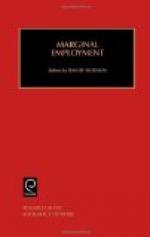|
This section contains 3,649 words (approx. 13 pages at 300 words per page) |

|
Introduction
In industrialized countries the principal way in which adults and their families make ends meet economically is through employment in the formal labor force. In the United States, earnings in the form of wages and salaries account for 71 percent of household income, on average. Even among individuals in poor families, half (49 percent) of all household income comes from earnings—their single most important source of income (Current Population Survey 1998). The centrality of work for economic well-being also is reflected in the close connection between finding gainful employment and exiting poverty on the one hand, and losing employment and sliding into poverty on the other. While formal employment is a necessary condition for economic well-being among almost all nonwealthy, able-bodied adults and their families, it is not a sufficient condition. Not all jobs pay well, many come without health and other benefits that workers must either...
|
This section contains 3,649 words (approx. 13 pages at 300 words per page) |

|


